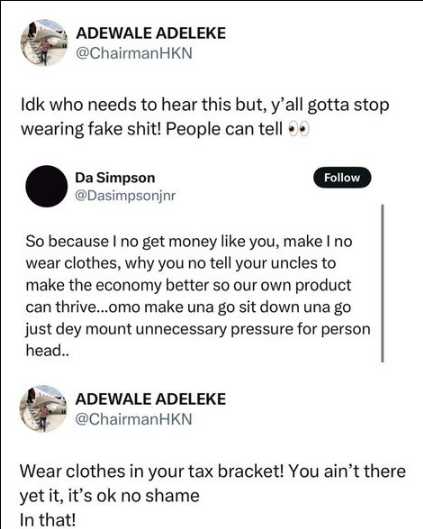A heated debate about class consciousness and fashion authenticity has erupted across Nigerian social media following controversial remarks by Adewale Adeleke, elder brother to Afrobeats superstar Davido, regarding the wearing of counterfeit designer items.
Taking to X (formerly Twitter), the wealthy entrepreneur and father of two ignited social discourse with his forthright advice urging people to “wear clothes in your tax bracket,” suggesting that individuals should limit their fashion choices to items that genuinely reflect their financial status.
The HKN Music chairman’s comments particularly targeted the widespread practice of wearing fake designer items, asserting that such counterfeits are easily identifiable to the discerning eye. His statement has touched a nerve in Nigerian society, where the pressure to maintain appearances through luxury fashion has become increasingly prevalent despite challenging economic conditions.
Adeleke’s remarks come at a particularly sensitive time when many Nigerians are grappling with economic hardships, making his comments about staying within one’s financial means appear tone-deaf to some observers. The timing of his statement has sparked discussions about wealth inequality, social pressure, and the role of designer fashion in Nigerian society.
The controversy highlights the complex relationship between social status and fashion in contemporary Nigerian culture, where designer brands often serve as visible markers of success and achievement. Adeleke’s position as a member of one of Nigeria’s most prominent entertainment families adds weight to his words while simultaneously drawing criticism about privileged perspectives on everyday struggles.
Beyond the immediate controversy, this incident has opened up broader conversations about authenticity, social pressure, and the economic realities faced by many Nigerians. While some view Adeleke’s comments as practical advice about living within one’s means, others see them as an unnecessary reminder of the vast wealth gap in Nigerian society.
As the discussion continues to evolve on social media, it reflects deeper societal tensions about wealth display, authentic living, and the pressures many face to maintain appearances in an increasingly image-conscious world. Whether intended or not, Adeleke’s comments have sparked an important dialogue about values, priorities, and the role of luxury fashion in contemporary Nigerian society.
The ongoing debate serves as a mirror reflecting the complex intersections of wealth, status, and identity in modern Nigeria, where the desire for luxury often clashes with economic realities. As this conversation unfolds, it raises important questions about how society balances aspirational lifestyle choices with financial responsibility in challenging economic times.



